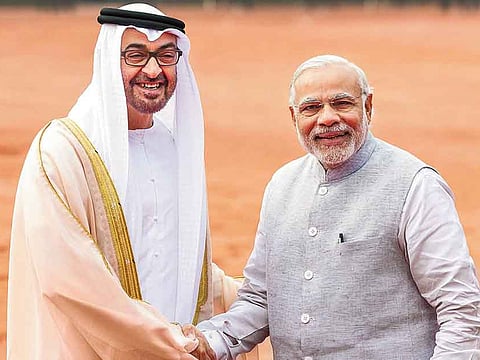India: Sharing a special relationship with the UAE
Ties between India and the UAE indicate an unprecedented level of trust and confidence, says Ambassador Navdeep Singh Suri

Indian Ambassador Navdeep Singh Suri, who arrived in the UAE last month, is a career diplomat. He has served as the Indian high commissioner in Canberra, Australia, and in India’s diplomatic missions in Cairo, Damascus, Washington, DC, Dar es Salaam and London, as well as consul general in Johannesburg. GN Focus sat down with him for an exclusive interview at his office in the Indian Embassy in Abu Dhabi.
His Highness Shaikh Mohammad Bin Zayed Al Nahyan, Crown Prince of Abu Dhabi and Deputy Supreme Commander of the UAE Armed Forces, is the most prominent Arab leader in recent years to be invited as chief guest at India’s Republic Day parade. What is the visit’s significance?
To put it into context, given the rising stature of India on the global stage, we host 50-60 heads of state every year, yet only one is chosen for special attention and that is the chief guest for Republic Day. We are sending a clear signal, not only to the UAE but also to the whole world that this is a country with which we have a special relationship. The Republic Day parade is watched by around 70 million Indians, and it’s also a message to the Indian public in terms of shaping perceptions. It is an important symbolic gesture.
Prime Minister Narendra Modi and Shaikh Mohammad share a special friendship. What are your thoughts?
The two leaders clearly share a vision for closer ties. We are working together on a comprehensive strategic partnership between India and the UAE. This is something we have with only few nations. It embraces not just the traditional topics of trade, investment or energy but also goes beyond that into defence, security, counterterrorism, deradicalisation and shared concerns on a lot of other areas.
Is this a new era for India-UAE relations?
Absolutely, but I would go a step further. If you look at some of the private conversations taking place between the countries in defence, security, intelligence sharing, particularly the shared common concern on countering terrorism and radicalism, it indicates a level of trust and confidence that can only take place among friends. It is no longer a high-level emotional connect, there is huge convergence in our views.
How can the UAE play a role in the Make in India campaign?
The fact that the UAE is investing $75 billion (Dh275.4 billion) into India is something that no other country has done. The scale of the commitment is significant. Some of it will go towards India’s roads, airports, ports, railways and parks — without which we cannot have a Make in India campaign. My aim is to work closely with agencies such as the Abu Dhabi Investment Authority and Mubadala to make it a reality. We are keen to attract UAE expertise and investment. A number of private companies in the UAE are also eyeing opportunities in India.
Why is this investment crucial?
We have huge requirements to develop our infrastructure. Some estimates suggest we have a need to spend up to a trillion dollars on infrastructure over the next few years if we are to achieve some of our development goals.
What can we expect as the focus of your role as ambassador to the UAE?
The timing of my arrival here coincides with a real upswing in India’s relationship with the UAE. The momentum we see can be gauged by the fact that since the visit of Modi in August 2015, Shaikh Mohammad visited India last February and, in less than a year, he is back for a second state visit, which is very special. My primary focus is to deliver on the vision of the leaders.
The second is in terms of the Indian community in the UAE. At the top end, you got some of the most successful businessmen in the UAE. Then you have Indians who are top professionals in the country. About 70 per cent of Indians in the UAE are blue-collar workers. It is important for me that we give our fullest attention to their welfare and well-being.
Sign up for the Daily Briefing
Get the latest news and updates straight to your inbox



